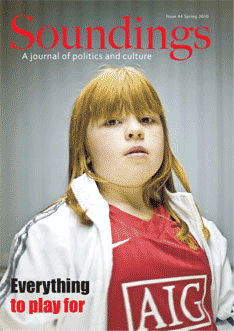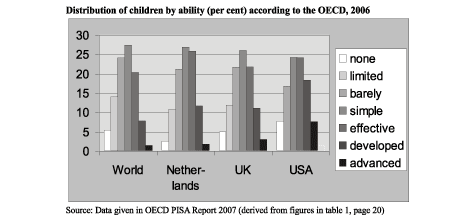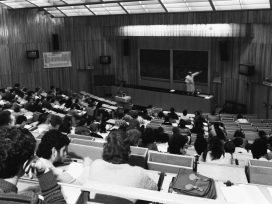 As inequality becomes ever more deeply entrenched into contemporary everyday life, there has been a creeping return to the idea of innate ability. At the same time, priorities in education have become increasingly determined by a utilitarian concern for the needs of the economy, rather than for developing the thinking of each child. One place where the effects of these interconnected trends can be seen is in the OECD’s reports on learning skills (for it is now part of the business of the OECD – an organisation of economists – to tell countries how well educated their children are). Its comparative report on learning skills among 15-year-olds is therefore a good starting point for a reflection on the connections between elitism, neoliberal ideas of competitiveness and concepts of innate ability.
As inequality becomes ever more deeply entrenched into contemporary everyday life, there has been a creeping return to the idea of innate ability. At the same time, priorities in education have become increasingly determined by a utilitarian concern for the needs of the economy, rather than for developing the thinking of each child. One place where the effects of these interconnected trends can be seen is in the OECD’s reports on learning skills (for it is now part of the business of the OECD – an organisation of economists – to tell countries how well educated their children are). Its comparative report on learning skills among 15-year-olds is therefore a good starting point for a reflection on the connections between elitism, neoliberal ideas of competitiveness and concepts of innate ability.
The Netherlands is the country which best approximates to the OECD economists’ favoured 1:1:2:2:1 distribution of children according to categories of ability (which are, respectively: limited, barely adequate, simple, effective and developed – corresponding to the OECD’s international testing levels of 1 to 5 – see graph below). It may surprise you to learn that the Netherlands – with 51 per cent of its children classified as “simple” or worse – fares particularly well on comparisons of this kind. Only half a dozen countries, out of more than fifty surveyed, did significantly better when last compared (in 2006): an even larger percentage of children were awarded the damning labels of “limited”, “barely adequate” and “simple” in both the United Kingdom and the United States.

According to the OECD, in Finland and New Zealand the top level “genius strand” is reached by 4 per cent; in the United Kingdom and Australia it is 3 per cent; in Germany and the Netherlands 2 per cent; in the United States and Sweden 1 per cent; and in Portugal and Italy nearer to 0 per cent. These are the children who, according to the educational economists, show real promise. These are the children who have been trained in techniques such that they answer exam questions in the ways that the examiners – operating in the light of OECD economic beliefs – would most like them to be answered. The way this small group of children behave, they could one day even become educational economists themselves. As it turns out, however, the proportions of such children are so low in these comparisons because the international tests are set in a way that seeks the distribution of results around a “bell curve”, whose smoothly tapering tails are cut off precisely to produce results that label 1.3 per cent as geniuses and 5.2 per cent as know-nothings.
The OECD report does not actually include any statistics shown as bell curves, perhaps because its authors know that such representations would arouse suspicion. But if you read the report’s technical manual (released three years after the survey), you will find hidden after 144 pages of equations and procedures the statement that, in calibrating the results (adjusting the scores before release): “those releasing this data … assumed that students have been sampled from a multivariate normal distribution”. Given this assumption, almost regardless of how the students had “performed”, the statistical curves produced would have been bell shaped. The data was made to fit the curve. It is not hard to devise a set of questions and a marking scheme that results in those you test appearing to be distributed along a bell curve. But to do this you must first have it in your mind to construct the world as being like this. It is not revealed as such by observation.
It goes without saying, of course, that there is very little room within a bell curve to be at the top.
The knowledge base that the OECD refers to is a particular kind of knowledge that comes from a particular way of valuing people, of seeing the world, a way that came to dominate the thinking of those appointed to high office in the rich world at the start of the twenty-first century. For example, the OECD uses the results of its international comparative exercises for the purpose of making claims that “having a larger number of schools that compete for students was associated with better results”. Indeed, many of the people who work for organisations such as the OECD feel they have a duty to suggest that competition between countries, schools and pupils is good, and to encourage it as much as they can: and they appear to be appointed largely on the basis that they share this belief, and that – in the case of the education section – they can produce tables showing how many children are doing badly, how few are doing well, and, by inference, how much better prepared the large majority need to be to achieve such things as “Science Competencies for Tomorrow’s World”. Their imagined tomorrow’s world is a utopia where all will benefit from increased competition, from being labelled by their apparent competencies. This is a place where it is imagined that the good of the many is most enhanced by promoting the ability of the few.
Another way of understanding the cultural embeddedness of concepts of intelligence and intelligence testing is to observe that ever since we have been trying to measure “intelligence” we have found its levels to have been rising dramatically. This is true across almost all countries in which we have tried to measure it. The average child in 1900, measured by today’s standards, would appear to be an imbecile, mentally retarded, a “virtual automaton”. Our intelligence when measured is so much greater than that of our parents that you would think they might have wondered at the extraordinary subtlety of their children’s conversations. All that actually happened, of course, was that in affluent countries over the course of the last century most people became better fed, and were better educated in the kinds of scientific thinking which score highly under intelligence tests.
IQism: the underlying rationale for the growth of elitism
The merits of thinking of intelligence as something of which each individual has an allotted quotient (i.e. the concept of IQ), though having its origin in earlier theories of innate ability, was pushed forward fastest in Britain in the 1950s, when almost all eleven year olds were subjected to testing to determine which kind of secondary school they would be sent to. In the later 1960s and 1970s this brutal sorting of children into camps was challenged, and the comprehensive system was widely introduced. But today the beliefs which lead to this discrimination against the many have once more become the mainstream beliefs of those who make recommendations over how an affluent economy should be run.
The assumption underpinning the concept of IQ is that intellectual ability is limited physically, like height. (Most people who were initially told of the idea were also told that their IQ was high; while the people who propagated the idea thought that their own IQs were even higher.) But thinking is as much like height as singing is like weight. You can think on your own, but you best learn to think with others. Education does not unfold from within but is almost all “induction from without”. There are no real “know-nothings”. We are all occasionally stupid, especially when we have not had enough sleep, or feel anxious and “don’t think”. We are similarly all capable of singing or not singing, singing better or worse, singing in groups or alone. What is seen as good singing is remarkably culturally specific, varying greatly by time and place. Work hard at your singing in a particular time and place and people will say you sing well if you sing as you are supposed to. It is possible to rank singing, to grade it, and to believe that some singing is truly awful while some is exquisite, but the truth of this is as much in the culture and ear of the listener as it is from the vocal cords of the performer. Someone has almost certainly been silly enough to propose that human beings have singing limits which are distributed along a bell-shaped curve. After all is said, we are all capable of being stupid. But the bell-curve-of-singing idea did not catch on. We are not as vain about how good we are at yodelling in the shower as we are about being told we are especially clever.
The misconception of the existence of “gifted” people grew out of beliefs that talents were bestowed by the gods, who each originally had their own special gifts (of speed, art, or drinking, say). The misconception was useful for explaining away the odd serf who could not be suppressed in ancient times, or the few poor boys who rose in rank a century ago. But then ideas about intelligence changed, and such a distribution of talent was abandoned in favour of a distribution reshaped as bell-curved: the bell curve as a general description of the population became popular as more people were required to fulfil social functions that had not existed in such abundance before: engine operator, teacher, tester. This led to the creation of tests that could produce a bell-curved set of statistics. For if you apply an IQ test to a population that the test was not designed specifically for, most people will either do very badly or very well; they will not perform in a way that produces a bell-curve distribution. Tests have to be designed and calibrated to result in such an outcome. In a more equal society, the aim would be to move the rise of the curve rightwards, and attempts were made in this direction during the 1970s, but in the neoliberal era we have returned to a more restricted view of the distribution of talents.
Although in the affluent west we are now almost all fed well enough not to have our cognitive capabilities limited physically through the effects of malnutrition on the brain, and more and more children are better nurtured and cared for as infants, and although we are now rich enough to afford for almost all to be allowed to learn in ways our parents and grandparents were mostly not allowed, we still hold back from giving all children that encouragement and, instead, tell most from a very early age that they are not up to the level of “the best in the class”. And never can be – by definition. Within our families all our children are special, but outside those cocoons they are quickly ranked, told that to sing they need to enter talent shows that only a tiny proportion can win, told that to learn they need to work harder than the rest and – more importantly – need to be “gifted”.
Children need to be “gifted”, it is now commonly said, to attain the level of a well developed “level 5” child. They need to be “especially gifted” to be that seventh of a seventh that reach “level 6”, and it is harder still to win a rung on the places endlessly stacked above that scale. Most are told that even if they work hard they can at best only expect to rise one or two levels, to hope to be simple rather than no-knowing; or to have effective knowledge, to be a useful cog in a machine, rather than just be a simpleton (if you do particularly well). Aspiring to reach more than one grade above your lot in life is seen as fanciful. Arguing that there is not a mass of largely limited children out there is portrayed as misguided fancy by the elitists. Most of the elitists say this quietly, but occasionally a few say what they think in public, and I have collected some of these musings in the book from which this article is drawn. Such public outbursts are not the isolated musings of a few discredited former schools’ inspectors or other mavericks. They reveal what is generally believed by the kinds of people that run the governments that appoint such people to be schools’ inspectors. It is just that elitist politicians tend to have more sense than to tell their electorate that they believe most of them to be so limited in ability.
You might think that what the OECD educationalists are doing is trying to move societies from extreme inequality in education, to a world of much greater equality. However, the distribution of “ability” is not progressively changing shape from left-skewed to right-skewed. As the figures show, in countries such as the Netherlands, Finland, Japan and Canada, the system teaches more children what they need to know to reach the higher levels. In those countries it is less common to present a story of children having innate differences. But in other countries, such as the United Kingdom, Portugal, Mexico and the United States, where more are allowed to learn very little, children are more often talked about as coming from “different stock”. The position of each country on the scale of how elitist their education systems also varies over time. In fact, ways in which different groups are treated differently within countries at different times can be monitored by looking at changes in IQ test results. This evidence clearly demonstrates that the tests measure how well children have been taught to pass them. That is why the generation you are born into matters so much in determining IQ. Intelligence tests have nothing to do with anything innate.
The return to elitism
In the United States the “IQ gap” between black and white Americans fell between the 1940s and the 1970s, but by the start of the twenty-first century inequality had risen back to 1940s levels. The move away from elitism and then back occurred in tandem with changes in the social position and relative deprivation of black versus white Americans. From the 1940s to the 1970s black Americans won progressively higher status; they won the right to be integrated more into what had become normal economic expectations; and wages equalised a little between black and white. Then, from the 1970s to 2009 the wage gap grew; segregation increased again; and civil rights victories were rolled back by the mass incarceration of young black men. Measured levels of ability decreased in relative terms at around the same rate. Treating a few people as especially able inevitably entails treating others as especially unable. And if you treat people like dirt you can watch them become more stupid before your eyes – or at least through their answers to your multiple choice questions in public examinations, and in their restricted options in life thereafter. From the 1970s onwards poor Americans, and especially poor black Americans, were progressively treated more and more like dirt. To a lesser extent similar trends occurred in many other parts of the affluent world, in all the rich countries where income inequalities grew. And they grew most where IQism became most accepted.
IQism can be a self-fulfilling prophesy. If you believe that only a few children are especially able, then you concentrate your resources on them and subsequently they will tend to appear to do well. They will certainly pass your tests, as the tests are designed to pass a certain number, and the children you selected will have been chosen and then taught to pass the tests. Young people respond well to praise to learn, and get smarter when they learn as a result. The young respond badly to disrespect; it reduces their motivation to learn: they perform badly in tests when they are taught with little respect. Telling children they rank lowly in a class is a way of telling them that they have not earned respect.
Children are not particularly discerning about what they are taught. They will try to do well at IQ tests if you train them to try to do well at IQ tests. Almost all people want to fit in, to be praised, not to rank towards the bottom, not to be seen as a liability. Indeed it was recognition of these effects that helped drive educationists’ campaign for an end to the 11-plus system in the 1970s.
Unfortunately, greater equality of opportunity is almost always seen as a threat to the relatively privileged. And, although the start of the 1970s was a great time to be ordinary in affluent countries, and not a bad time to be poor, it was a disconcerting time if you were affluent. Inflation was high; if you were well off enough to have savings, those savings were being eroded. You began to realise that your children were not going to be as cushioned as you were by so much relative wealth, by going to different schools from most children. When politicians said that they were going to eradicate the evil of ignorance by educating all in Britain, or that they were going to have a “Great Society” in America, they did not mention that this would reduce the apparent advantages that your children had. Equal rights for black children, a level playing field for poor children – these were seen as threats in a race in which only a few can win. And as the economy deteriorated in the late 1970s, this fear of equality grew, and so did the backlash against the progressive changes of the 1960s and 1970s.
It is not hard for most people to know that they are not very special. Even affluent people, if not delusional, know in their heart of hearts that they are not very special; most know that they were members of what some call the “lucky sperm club”, born to the right parents, or just lucky – or perhaps both lucky and a little ruthless. It is only those with the strongest of narcissistic tendencies who think they became affluent because they were more able. Those who couple such tendencies with eugenicist beliefs think their children are likely to inherit their supposed acumen. The rest – the vast majority of the rich, who are not so stupid – had a choice when equality appeared on the horizon. They could throw in their lot with the masses, send their children to the local school, see their comparative wealth evaporate with inflation and join the party, or they could try to defend their corner, pay for their children to be segregated from others, and look for ways to maintain their advantages, in particular by voting into power politicians who shared their concerns. And they managed to convince enough voters that the centre left – who were responsible for this levelling of the playing field – had been a shambles, in both the United States and United Kingdom. In Britain in 1979 and in the United States in 1980 the right won office.
As segregation of children in different state secondary schools in Britain was being (to a large extent) abolished, a boom began in the private sector, in newly segregated “independent” schooling. At the same time changes were gradually introduced into the state sector that allowed increasing levels of competition within an allegedly comprehensive system. By 2007 the English school system had become a market system, in which schools competed for money and children. The expansion of private schools was accompanied by the introduction of 57 varieties of state school. Privately educated children (7 per cent of the total) took one quarter of all advanced level examinations and gained over half the places in “top” universities. The better funded of the 57 varieties of state school accounted for most of the rest of elite places (supplemented by those who had some other advantage at home). Elitist systems claim to be meritocracies, but in such systems almost no one gets to the top without substantially benefiting from the unequal distribution of educational opportunities.
To believe that your children are in the top fifth requires first to believe that there is a top fifth. At any one time you can subject a group of children to testing and a fifth can be singled out as doing best. That fifth will be slightly more likely than their peers to rank in the top fifth in any other related test, but that does not mean that there is an actual top fifth that is waiting to be identified. The higher the correlations between different tests, the more the same children come to be selected in that top fifth under different test regimes. The more this happens, the more they will have been coached to perform well, and the more likely they are to live in a society that takes the idea of such testing seriously – a society, from government to classroom, that implicitly accepts the idea of inherent differences in ability, in intelligence quotas (or quotients), even when not explicitly admitting that they do. It is the smallest of steps from that position to accept that what you think is inherent is inherited. From putting prize winners on pedestals to putting whole populations in prisons, how we treat each other reveals how we see each other. This IQism has become the current dominant unquestioned underlying belief of most educational policy-makers in the more unequal of affluent nations.
People who have taught the children of the affluent classes at the universities they go to have seen the result of this growth in elitism. These children have been educationally force-fed enough facts to obtains strings of A grades, but they are no more geniuses than anyone else. There is a tragedy in making young people pretend to super-human mental abilities which neither they nor anyone else possess. To justify their situation they have to swallow and repeat the lie being told more and more often, that only a few are especially able and that those few are disproportionately found amongst the higher social classes.
In the more unequal affluent countries, such as Britain and the United States, it has become a little more common in recent years for the elite to suggest amongst themselves that children born to working-class or black parents simply have less natural ability than those born to higher-class or white parents. The people who say such things are merely a little more bold in uttering the claims made commonly, if discreetly, by the class they are in or have joined. They often go on to quietly suggest that children of different class backgrounds tend to do better or worse in school on account of some “complex interplay of sociocultural and genetic factors”. It may sound more nuanced to include words such as complex, and sociocultural in your educational parlance, but once “genetic factors” are brought into the equation all nuance is lost. “Genetic factors” can be used to defend arguments that any category of less privileged people – women, black people, working-class people – are inherently less able. Slip “genetic factors” into your argument and you cross a line.
Sadly, it is belief in mumbo jumbo like the IQ gene that results in teachers being asked around the rich world to identify children who may become especially “gifted and talented”, with all the consequences that that implies. At times these assumptions are made explicit, such as in the official proposals to change English Education Law in 2005 in which it was claimed that: “we must make sure that every pupil – gifted and talented, struggling or just average – reaches the limits of their capability”. In England the idea that different children have different limits has for so long been part of the social landscape that, despite the best efforts and advice, it still underlies key thinking.
Yet we all become more able through learning. We learn collectively. And it is through learning together that we will eventually come to understand that if performing at a uniform level in tests of a particular kind of logic were an important trait for humans to possess, we would almost all possess it, just as we almost all have binocular vision and an opposable thumb. There is so much more that is vital to being human, to working together, than being good at bizarre tests and manipulating numbers. There are no important genetic differences in ability for elitists to use to justify their elitism. We are all human. No one is super-human. We work and live better together, rather than divided by caste, class, or classroom. We are all “still learning to think”.

 As inequality becomes ever more deeply entrenched into contemporary everyday life, there has been a creeping return to the idea of innate ability. At the same time, priorities in education have become increasingly determined by a utilitarian concern for the needs of the economy, rather than for developing the thinking of each child. One place where the effects of these interconnected trends can be seen is in the OECD’s reports on learning skills (for it is now part of the business of the OECD – an organisation of economists – to tell countries how well educated their children are). Its comparative report on learning skills among 15-year-olds is therefore a good starting point for a reflection on the connections between elitism, neoliberal ideas of competitiveness and concepts of innate ability.
As inequality becomes ever more deeply entrenched into contemporary everyday life, there has been a creeping return to the idea of innate ability. At the same time, priorities in education have become increasingly determined by a utilitarian concern for the needs of the economy, rather than for developing the thinking of each child. One place where the effects of these interconnected trends can be seen is in the OECD’s reports on learning skills (for it is now part of the business of the OECD – an organisation of economists – to tell countries how well educated their children are). Its comparative report on learning skills among 15-year-olds is therefore a good starting point for a reflection on the connections between elitism, neoliberal ideas of competitiveness and concepts of innate ability.





